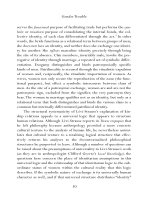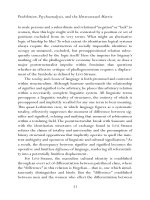GENDER TROUBLE 149
Bạn đang xem bản rút gọn của tài liệu. Xem và tải ngay bản đầy đủ của tài liệu tại đây (20.45 KB, 1 trang )
Gender Trouble
various cultural expressions manifest the selfsame principle of maternal heterogeneity? Kristeva simply subordinates each of these cultural
moments to the same principle. Consequently, the semiotic represents
any cultural effort to displace the logos (which, curiously, she contrasts
with Heraclitus’ flux), where the logos represents the univocal signifier, the law of identity. Her opposition between the semiotic and the
Symbolic reduces here to a metaphysical quarrel between the principle
of multiplicity that escapes the charge of non-contradiction and a principle of identity based on the suppression of that multiplicity. Oddly,
that very principle of multiplicity that Kristeva everywhere defends
operates in much the same manner as a principle of identity. Note the
way in which all manner of things “primitive” and “Oriental” are summarily subordinated to the principle of the maternal body. Surely, her
description warrants not only the charge of Orientalism, but raises the
very significant question of whether, ironically, multiplicity has
become a univocal signifier.
Her ascription of a teleological aim to maternal drives prior to
their constitution in language or culture raises a number of questions
about Kristeva’s political program. Although she clearly sees subversive
and disruptive potential in those semiotic expressions that challenge the
hegemony of the paternal law, it is less clear in what precisely this subversion consists. If the law is understood to rest on a constructed
ground, beneath which lurks the repressed maternal terrain, what concrete cultural options emerge within the terms of culture as a consequence of this revelation? Ostensibly, the multiplicity associated with
the maternal libidinal economy has the force to disperse the univocity
of the paternal signifier and seemingly to create the possibility of other
cultural expressions no longer tightly constrained by the law of noncontradiction. But is this disruptive activity the opening of a field of significations, or is it the manifestation of a biological archaism which
operates according to a natural and “prepaternal” causality? If Kristeva
believed the former were the case (and she does not), then she would
be interested in a displacement of the paternal law in favor of a prolifer114









